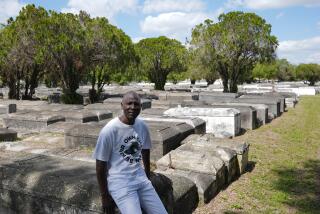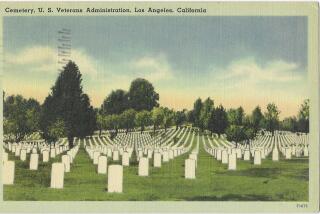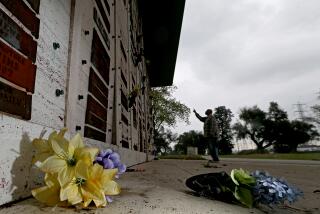Wisconsin’s Cemeteries Under Siege
- Share via
MILWAUKEE — Mary Leggett stood in Evergreen Cemetery and looked lost.
“I cannot believe this,” she said last fall while searching for her brother’s grave.
It was her first visit to the cemetery since 1997, three years after his burial. The cemetery was so overgrown with weeds and grass that her brother’s grave had disappeared.
Nolan Dorsey looked lost too. The cemetery caretaker carried a map as he maneuvered through the suburban Milwaukee graveyard. At one point he thought he might have found the grave of Leggett’s brother; he brushed away the grass.
Wrong grave.
“How can anybody allow this to happen?” said Leggett, who left that day without finding her brother’s grave.
Leggett isn’t the only one who has had problems with a cemetery in Wisconsin.
From 1994 to last summer, the state Department of Regulation and Licensing received 152 complaints regarding cemetery or burial-related businesses, ranging from accusations of high-pressure sales talk and sunken graves to people who couldn’t find family members’ graves.
The Associated Press reviewed 125 complaints the department closed between 1994 and August 1999. Of those, the state took formal action in four. Pending complaints were not released.
State officials gave a number of reasons why the overwhelming majority of cases were closed without formal action. In many, the state said it found no violation or the complaint was resolved.
However, nearly a third of the cases dealt with issues beyond the department’s regulatory jurisdiction. The department doesn’t regulate religious and municipal cemeteries; it also lacks the authority to set standards for the maintenance of cemetery grounds. Officials say only about 88 of the 2,000 to 3,000 cemeteries in Wisconsin are state-regulated.
“The laws are inadequate,” said Marlene Cummings, secretary of the Department of Regulation and Licensing.
However, the overwhelming majority of cemeteries in the United States are nonprofit or municipal and are generally exempted by law from regulation, according to Bob Feelf, general counsel of the International Cemetery and Funeral Assn. in Reston, Va.
Although Cummings’ department has jurisdiction over burial procedures, critics say the law doesn’t allow for enough oversight to ensure cemeteries are properly mapping graves so family members can find loved ones.
Nearly half of the 125 cases were closed without investigation by a screening panel made up of representatives of the cemetery and grave-marker industries.
The panel tries to act objectively, and cemetery officials are asked to remove themselves from cases that concern them, according to Cletus Hansen, administrator of the department’s Division of Business, Licensure and Regulation. The department referred at least 12 cases to other authorities.
At least six of those cases led to formal action or compliance, but the department did not know exactly what happened to all complaints that were referred.
Of the four cases involving disciplinary action, two involved the general manager of a private cemetery in Neenah, who was reprimanded and fined $1,000 for violations that included using false, deceptive or misleading ads and employing an unlicensed salesman.
Another case involved a man rejected by the state for a cemetery salesman’s license, in part because his application contained misstatements about a conviction record that included theft and forgery.
The fourth case involved Evergreen Cemetery, which is the focus of a state lawsuit and was the subject of protests by people with family members buried there.
Even Cummings, the state’s top cemetery regulator, noticed poor conditions at Evergreen--a pothole so big that a funeral director held a sign warning people about it.
But Cummings didn’t consider reporting it to her own office.
“If I had complained, what would I have complained about?” Cummings said.
The best her department could do was reach an agreement with Evergreen’s owner to correct problems, and file a complaint with the state attorney general’s office, which sued the cemetery’s current and previous owners, she said.
The department now is seeking changes to allow regulators to deal with all cemeteries, enforce rules on maintenance and create a board, including representatives of the public and the cemetery industry, with final say on disciplinary action, Hansen said.
More to Read
Sign up for Essential California
The most important California stories and recommendations in your inbox every morning.
You may occasionally receive promotional content from the Los Angeles Times.













